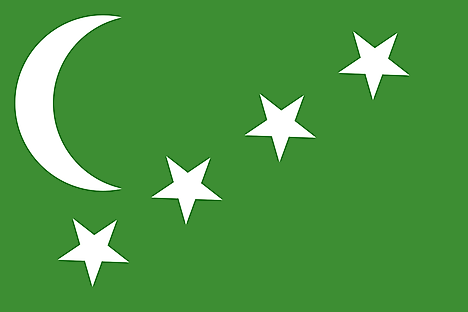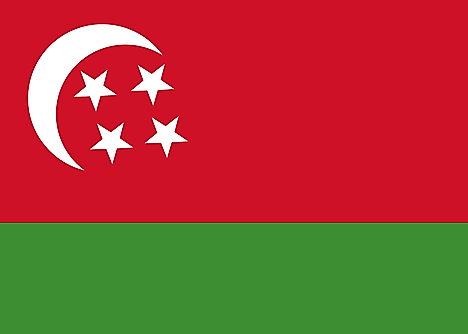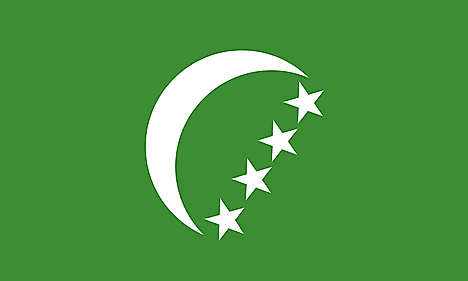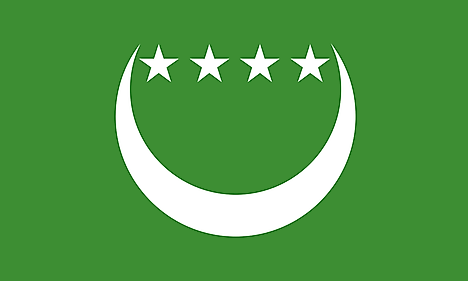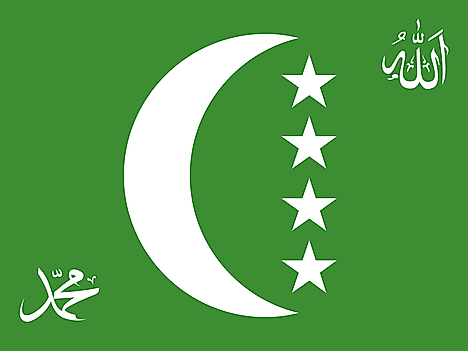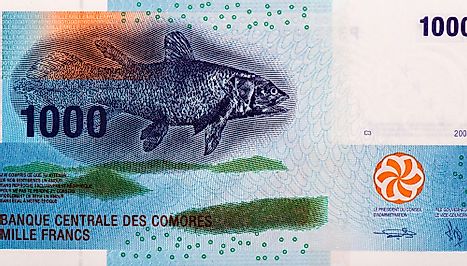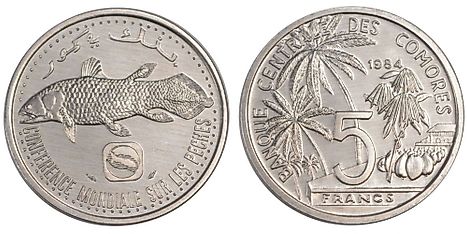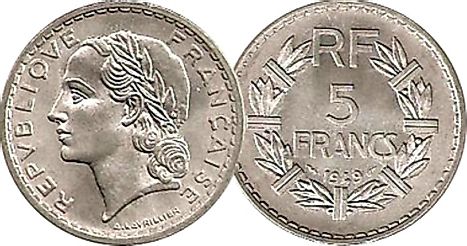Flags, Symbols, & Currencies of Comoros
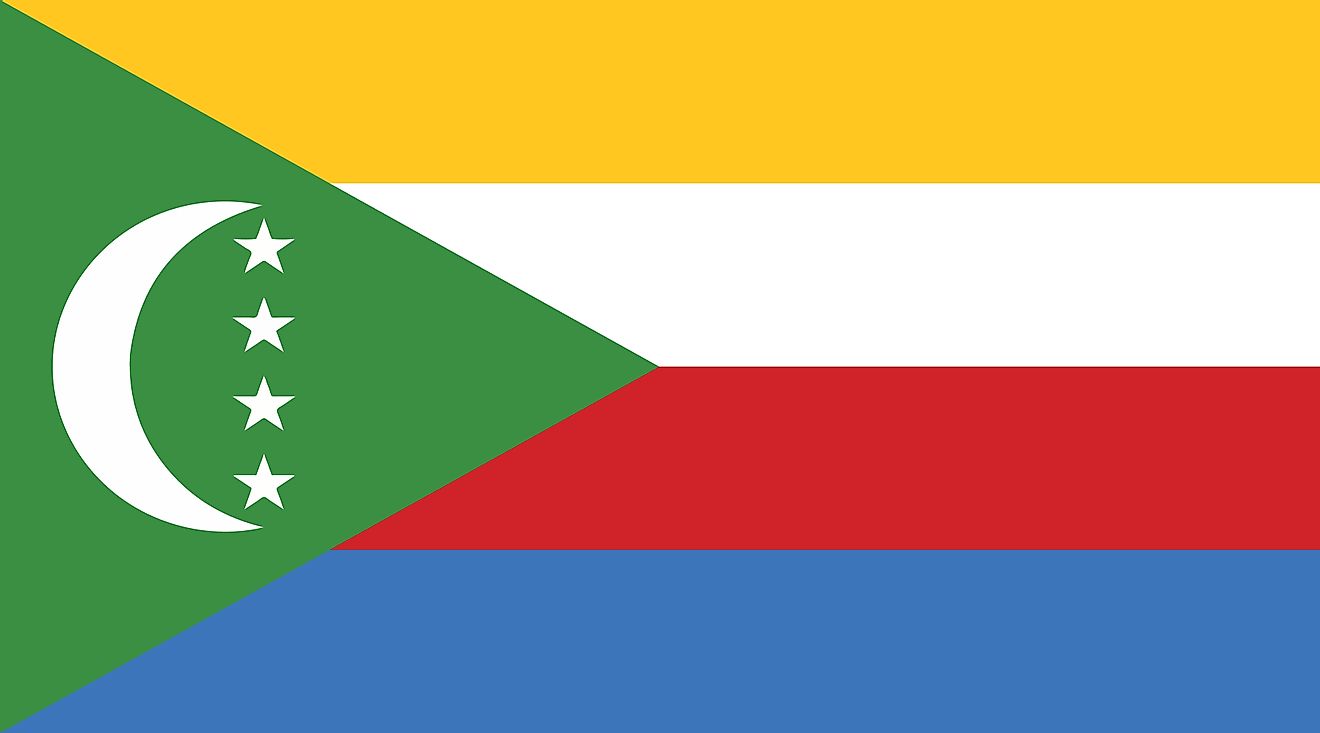
The current national flag of Comoros was adopted on December 23, 2001 as a replacement of the crescent flag on green background. Since independence in 1963, Comoros has had a total of six different but closely related flags designs. The current flag contains features of the independence flag and additional colors. It features four equal horizontal bands of yellow (top), white, red, and blue, with a green isosceles triangle based on the hoist. Centered within the triangle is a vertical white crescent moon with the convex side facing the hoist and four white, five-pointed stars placed vertically in a line between the points of the crescent.
The horizontal bands and the four stars represent the four main islands of the archipelago - Mwali, N'gazidja, Ndzuwani, and Mahore (Mayotte - department of France, but claimed by Comoros). The crescent, stars and the color green are traditional symbols of Islam. The national flag of Comoros has a height to length proportion of 3:5.
History of the Flag of Comoros
When Comoros was a French Protectorate (1886 to 1963), the French tricolor was the island's official flag. In 1963, about 12 years before independence, the country adopted a green flag with crescent on the upper hoist and four diagonal stars. In 1976, the flag's design was changed to include two horizontal bands of red (top) and green with crescent and stars moved further up. In 1978, the flag changed again to a green field with crescent at the center and stars forming straight line from one tip of the crescent to the other tip. When Comoros adopted a new constitution in 1992, it again changed the flag design. The green field was retained but the crescent and stars rotated to face upwards. In 1996, another constitution was adopted and the flag's design changed, with the crescent and stars rotated to face the fly. White Arabic inscriptions were added on the upper fly and lower hoist.
Symbols of Comoros
National Coat of Arms of Comoros
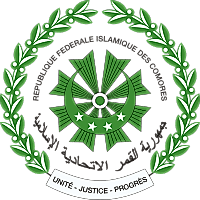
The current national seal of was adopted in 1978 as a replacement for the old seal used between 1975 and 1978. It features a crescent with four stars as found on the national flag. Extending out from the crescent are the rays of a sun. Above and below the sun rays is the name of the nation, written in French and Arabic respectively. Two olive branches make up the border and joined together by stripe bearing the nation's motto: Unité, Solidarité, Développement ("Unity, Solidarity, Development").
National Anthem
- Anthem Title: Udzima wa ya Masiwa
- Music composer: Said Hachim Sidi Abderemane and Kamildine Abdallah
- Lyricist: Said Hachim Sidi Abderemane
- Date of Adoption: 1978
Udzima wa ya Masiwa (The Union of the Great Island) is Comoros' national anthem, adopted in 1978 at independence. The lyrics of the anthem were written by Said Hachim Sidi Abderemane and together with Kamildine Abdallah set them to music. The Shimasiwa or French lyrics are grouped into three stanzas, with the middle stanza being the longest. The first stanza is a reminder of the country's independence while the last two stanzas is a call for the people to be devoted to their country.
Udzima wa ya Masiwa (Shimasiwa)
I béramu isi pépéza
I nadi ukombozi piya
I daula ivénuha
Tasiba bu ya i dini voya trangaya hunu Komoriya
Narikéni na mahaba ya huveindza ya masiwa
Yatruwasiwa Komoro damu ndzima
Wasiwa Komoro dini ndzima
Ya masiwa radzali wa
Ya masiwa yarileya
Mola né ari sayidiya
Narikéni ha niya
Riveindzé uwataniya
Mahaba ya dine na duniya.
I béramu isi pépéza
Rang mwési sita wa Zuiye
I daula ivénuha
Zisiwa zatru zi pangwi ha
Maoré na Nzuani, Mwalina Ngaziya
Narikéni na mahaba ya huveindza ya masiwa.
The Union of the Great Islands
The flag is flying,
Announcing complete independence;
The nation rises up
Because of the faith we have
In this our Comoria.
Let us always have devotion
To love our Great Islands.
We Comorians are of one blood,
We Comorians are of one faith.
On these Islands we were born,
These Islands brought us up.
May God always help us;
Let us always have the firm resolve
To love our fatherland,
Love our religion and the world.
The flag is flying.
From the Sixth of July
The Nation rises up;
Our Islands are lined up.
Mayotte and Anjouan, Moheli and N'Gazidja,
Let us always have devotion
To love our Great Islands.
The Currency of Comoros is the Comorian franc
The Comorian franc became the official currency of Comoros and replaced the French franc of France issued when Comoros became a French Protectorate in 1886. The smallest division of the Comorian franc is 100 centimes. However, it has never been produced.
Comorian Coins
The issuance of the Ngazidja of bronze 10 and five centimes and 5 francs of silver was first done by Bambao’s Sultan Ali in the year 1890. The production took place in Paris using the same features as the French coins.
In 1964, the introduction of coins to be used by the Comoros replaced the Madagascar coins. Different denominations in use were aluminum-bronze 20 and 10 franc coins and 5, 2, and 1-franc. Another type of coin, nickel 50, got introduced in 1975 and after that, the 100 francs’ nickel in 1977, nickel 25 francs and nickel-plated- steel in 1981 and 1990 followed respectively. From 1975, Comorian francs had been in circulation.
Banknotes
It was in 1920 when the first Comorian money in paper form was produced. One franc and 50 centimes circulated. The banknotes continued to flow as it was provided by Banque de Madagascar et des Comores until 1962 when the word “COMORES” began to be inscribed on the notes. The 5,000, 1,000, and 500 francs replaced the banknotes bearing” COMORES” the year 1976. The issuance of paper money became the responsibility of Central Bank from 1984.
Banque de France prints the Comorian banknotes at a paper mill in the Vic-le-Comte. The current notes (10000, 5000, 2000,1000 and 500 francs) have increased their security properties in recent years in order to deter fake duplication
Historical Currencies of Comoros
When Comoros became a French Protectorate in 1886, the French currency (franc) was used as the Island's currency. The French currency continued to circulate even after Comoros became a province of Madagascar. However, between 1925 and 1943, the Malagasy franc was used throughout Madagascar, including its provinces. In 1945, Comoros separated from Madagascar and adopted CFA franc as its currency. In 1979, Comoros signed a monetary cooperation agreement with France, making the island part of the franc zone. It effectively adopted the Comorian franc.
